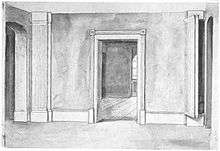Goosey Goosey Gander
"Goosey Goosey Gander" is an English-language nursery rhyme. It has a Roud Folk Song Index number of 6488.
History and interpretation

Some have suggested that this rhyme refers to priest holes—hiding places for itinerant Catholic priests during the persecutions under King Henry VIII and later under Oliver Cromwell. Once discovered the priest would be forcibly taken from the house ('thrown down the stairs') and treated badly.[1] Amateur historian Chris Roberts suggests further that the rhyme is linked to the propaganda campaign against the Catholic Church during the reign of Henry VIII.[2]
Other interpretations exist. Mark Cocker and Richard Mabey note in Birds Britannica that the greylag goose has for millennia been associated with fertility, that "goose" still has a sexual meaning in British culture, and that the nursery rhyme preserves these sexual overtones ("In my lady's chamber").[3]
Lyrics
The most common modern version of the lyrics is:
Goosey goosey gander,
Whither shall I wander?
Upstairs and downstairs
And in my lady's chamber.
There I met an old man
Who wouldn't say his prayers,
So I took him by his left leg
And threw him down the stairs.[4]
Alternative versions

The earliest recorded version of this rhyme is in Gammer Gurton's Garland or The Nursery Parnassus published in London in 1784. Like most early versions of the rhyme it does not include the last four lines:
Goose-a goose-a gander,
Where shall I wander?
Up stairs and down stairs,
In my lady's chamber;
There you'll find a cup of sack
And a race of ginger.[4]
Some versions have the additional concluding lines:
The stairs went crack,
He nearly broke his back.
And all the little ducks went,
'Quack, quack, quack'.[5]
Iona and Peter Opie note records of a separate rhyme referring to the Crane fly recorded from about 1780, which they suggest may have been amalgamated with this rhyme in the early nineteenth century:
Old father Long-Legs
Can't say his prayers:
take him by the left leg,
And throw him downstairs.[4]
Cultural references
Books
- This rhyme plays a prominent part in Agatha Christie's 1941 novel N or M?.
- John Ashbery's 2005 poetry collection Where Shall I Wander takes its title from the rhyme.[6]
- Terry Eagleton's 2014 book How to Read Literature discusses ways to interpret this poem.
- The famous psychoanalist D. W. Winnicot quotes it in his case study The Piggle (1977)
- C.S. Lewis's book The Lion, the Witch and the Wardrobe lists "upstairs, downstairs, and in my ladies chamber" as instructions to search for stone statues.
- The rhyme is referenced in "A House to Let" by Dickens, Collins, Gaskell and Procter, in the chapter titled "Trottle's Tale".
Television
- In Sapphire and Steel Adventure 1 (1979), Rob, a young boy, is forced to recite a snippet of the rhyme. The show gives the rhyme's origin as from the time of the English Civil war, and mentions Parliamentarian Roundheads doing door-to-door searches for hiding Royalists and evidence of Royalist sympathisers.
- The last episode of the 1971–75 British TV series Upstairs, Downstairs is titled "Whither shall I wander?", while the subsequent verse of the rhyme, "Upstairs and downstairs", recalls the title of the series.
Movies
Drawings
The Goose-Step "Goosey Goosey Gander. Whither dost thou wander? Only through the Rhineland— Pray excuse my Blunder!"
Music
- Siouxsie and the Banshees's song 'Spellbound' refers to the rhymes last two lines:
"And don't forget When your elders forget To say their prayers Take 'em by the legs And throw up down the stairs"
Notes
- ↑ Oneill, Therese. "6 Forgotten Nursery Rhymes and Their Meanings". Mental Floss. Retrieved 26 September 2016.
- ↑ C. Roberts, Heavy words lightly thrown: the reason behind the rhyme (Granta, 2004), p. 23.
- ↑ Cocker, Mark; Mabey, Richard (2005). Birds Britannica. Chatto & Windus. pp. 74–76. ISBN 0-7011-6907-9.
- 1 2 3 I. Opie and P. Opie, The Oxford Dictionary of Nursery Rhymes (Oxford University Press, 1951, 2nd edn., 1997), pp. 191–2.
- ↑ Kear, Janet (2010). Man and Wildfowl. T & AD Poyser Ltd. ISBN 978-1-4081-3762-8. Retrieved 2012-01-13.
- ↑ Herd, David (2005-11-12). "Attention, shoppers". The Guardian. Retrieved 2012-03-02.
- ↑ Arabesque (1966) Movie Script ("Upstairs, downstairs-" "Or in my lady's chamber."), on springfieldspringfield.co.uk (accessed April 22d, 2018).
External links
